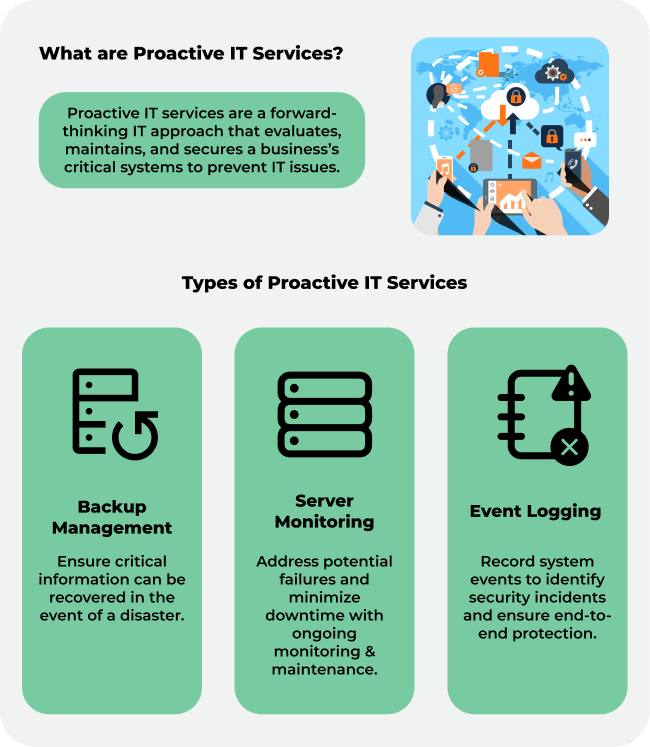For small to midsize businesses (SMBs), managing IT infrastructure can be a daunting task. Limited resources and expertise often mean that essential IT functions are neglected or poorly executed.
This can lead to significant problems, from data loss to extended downtime.
The solution: Proactive IT services, provided by managed service providers (MSPs), that ensure the assessment, maintenance, and security of a company’s critical IT systems. These services form the backbone of IT management support, helping businesses stay ahead in a rapidly evolving technological landscape.

Let’s look into three key components of proactive IT services: Backup Strategies, Server Monitoring, and Event Logging. We’ll discuss the benefits of each service along with the potential problems that arise when they are not properly managed.
Types of Proactive IT Services
The Importance of Backup Management

A robust backup strategy is essential for any business that values its data. Backups ensure that critical information can be recovered in the event of hardware failure, cyberattacks, or human error.
For SMBs, data loss can be catastrophic and lead to severe financial losses, damage to reputation, and even the potential closure of the business. Research from IBM and Ponemon Institute revealed that, in 2023, the global average cost of a data breach was a record-smashing $4.88 million.
In addition, as USA Wire noted, over half of workers confess to having mistakenly deleted business information at least one time. Proactive IT services, which include active IT solutions like automated backups and advanced monitoring tools, safeguard against data loss regardless of its source so that no disaster is unmanageable.
Benefits of Proactive Backup Management
- Data Protection: Regular backups protect against system failures, accidental deletions, or malicious attacks that can result in data loss. A reliable backup strategy means that, following an unexpected event, businesses can quickly restore data and resume operations.
- Compliance and Security: Many industries have regulatory requirements regarding data protection and retention. Proactive backup strategies support businesses to comply with all regulations, avoid potential legal penalties, and enhance customer trust.
- Business Continuity: With up-to-date backups, a business can recover quickly with minimal downtime after a disaster. This continuity is critical so that companies can maintain communication and service even during a chaotic situation.
What Can Happen Without Proactive Backup Management
- Data Loss: Businesses risk permanent loss of vital data, including customer information, financial records, and intellectual property, when they choose not to conduct frequent system backups.
- Extended Downtime: Without backups, recovery from an adverse incident resulting in data loss can be extensive and complex, causing prolonged operational interruption and potential lost revenue.
- Non-Compliance: Failure to maintain proper backup strategies can create industry compliance issues and lead to fines and legal problems.
Why is Server Performance Important?
Servers are at the core of IT infrastructure, hosting applications, databases, and other essential business services. It is critical to continuously monitor server performance to make sure systems are running smoothly and efficiently. Proactive server monitoring, an integral part of business computer tech support, ensures that these systems remain reliable and optimized.
Benefits of Proactive Server Monitoring
- Early Detection: Proactive server monitoring identifies possible problems before they escalate, allowing IT support to address potential failures and prevent downtime.
- Optimized Performance: By identifying performance bottlenecks, seeking stronger processes, and ensuring servers are operating at peak efficiency, businesses can improve user experience and increase productivity.
- Resource Management: Keeping track of server resource usage lets businesses better manage their IT resources and avoid over-provisioning or underutilization.
What Can Happen Without Proactive Server Monitoring
- Unexpected Downtime: If unmonitored, server issues can run rampant, unnoticed until they cause a significant outage. Then, necessary downtime disrupts business operations, leading to lost productivity and revenue.
- Performance Issues: Without monitoring in place, servers may experience performance degradation over time. This affects the capability of applications and services and downgrades user experience.
- Security Risks: Unmonitored servers are more vulnerable to security breaches. Regular monitoring helps detect suspicious activities, enabling swift intervention and preventing attacks.
What is Event Logging in Cybersecurity?

The Importance of Event Logging
Event logging is the systematic recording of events and activities within an IT system. These logs provide valuable insights into the security, health, and performance of IT infrastructure. Proactive event logging is often paired with advanced endpoint security measures to ensure end-to-end protection across IT systems.
Benefits of Proactive Event Logging
- Security Monitoring: Event logs help identify and investigate any security incidents so businesses can detect unauthorized access attempts or other malicious activities.
- Compliance and Auditing: Regulations in many industries require that businesses maintain detailed logs of IT activities. Proactive event logging ensures compliance with these requirements and facilitates the auditing process.
- Troubleshooting and Diagnostics: Event logs provide detailed information about system behavior and errors, making them essential when diagnosing and resolving any issues within IT infrastructure.
What Can Happen Without Proactive Event Logging
- Security Blind Spots: Preventing and navigating security incidents becomes challenging without an event log. The lack of transparency may result in undetected breaches and prolonged threat exposure.
- Non-Compliance: Without maintenance of adequate logs, businesses may fail to comply with industry regulations, possibly leading to legal penalties and reputation damage.
- Prolonged Troubleshooting: Diagnosing IT issues without logs is like finding a needle in a haystack. The absence of detailed logs makes it difficult to pinpoint problems, likely extending downtime and creating frustrated users.
The Role of Managed Service Providers (MSPs)
For SMBs with limited resources or technical expertise, managing these critical IT functions internally can be complex and challenging. Managed Service Providers (MSPs) make this process a lot simpler. When a business outsources proactive IT services, MSPs ensure reliable and efficient handling of these essential processes.
Benefits of Partnering with a Managed Service Provider (MSP)
- Expertise and Experience: Your MSP brings significant knowledge and a specialized background to the table. Think of your MSP as a team of experts well-versed in top-notch technologies and practices for IT management.
- Cost Savings: Compared to maintaining an in-house IT team, an outsourced provider with optimized, scalable, and customizable solutions can save time and cost for your business.
- Focus on Core Operations: Entrusting IT management to your MSP means that your business can focus on key tasks and innovative projects without being distracted by IT issues.
- 24/7 Support and Monitoring: MSPs provide round-the-clock monitoring and support so that systems are always functional and, if concerns arise, assistance is always promptly available.
Conclusion
For SMBs, proactive IT services are no longer a luxury but a necessity. Backup strategies, server monitoring, and event logging are critical to a company’s IT infrastructure. Your business must protect its data, enhance security measures, and assess insights to streamline successful outcomes.
Neglecting these important functions can lead to challenging and even catastrophic consequences, from extended downtime and user frustration to data loss, legal problems, and security breaches.
But partnering with a Managed Service Provider gives businesses the opportunity to access expert knowledge, save on costs, and center core functions while remaining confident that IT systems are protected and productive.
With proactive IT services, including IT management support and active IT solutions, businesses are better set to thrive in increasingly technology-driven and competitive industries. Make an investment in your current and future growth, stability, and peace of mind.
Contact us to discuss how proactive IT services could enhance productivity and benefit your bottom line.


